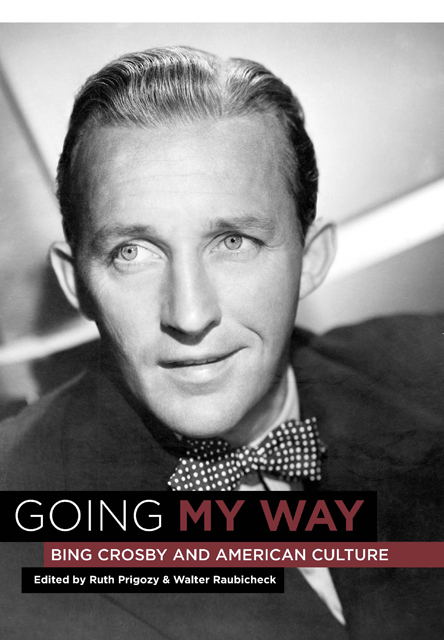Book contents
- Frontmatter
- Dedication
- Contents
- List of Illustrations
- Foreword
- Preface
- Acknowledgments
- Introduction Bing Crosby—Nothing Is What It Seems
- Part 1 Theoretical Perspectives on Crosby
- Part 2 Cultural Perspectives on Crosby
- Part 3 Historical Perspectives on Crosby
- Personal Comments
- Selected Bibliography
- List of Contributors
- Index
6 - American Archetypes: How Crosby and Hope Became Hollywood's Greatest Comedy Team
Published online by Cambridge University Press: 11 March 2023
- Frontmatter
- Dedication
- Contents
- List of Illustrations
- Foreword
- Preface
- Acknowledgments
- Introduction Bing Crosby—Nothing Is What It Seems
- Part 1 Theoretical Perspectives on Crosby
- Part 2 Cultural Perspectives on Crosby
- Part 3 Historical Perspectives on Crosby
- Personal Comments
- Selected Bibliography
- List of Contributors
- Index
Summary
In many ways Bob Hope and Bing Crosby are the most underrated comedy team in Hollywood history, probably because both performers achieved such tremendous success independently of their collaboration. But in terms of box-office success, cultural impact, and genuine innovation in screen comedy, Hope and Crosby rival, if not surpass, the great teams that come just before them and immediately follow them: the Marx Brothers in the thirties and Martin and Lewis in the fifties. The latter also achieved great success independently, but only after the team had irreparably split. Certainly it is time for a major “Road” picture revival, the kind the Marx Brothers enjoyed in the sixties. The recentDVDreleases will help renew public interest, but my main point is that much of the success of the team stems from the fact that unlike Chaplin, the Marx Brothers, Laurel and Hardy, and others who maintained roots in European comic traditions and personae, Hope and Crosby created characters whose roots were distinctively American. In fact, much of the humor of the series stems from the clash between the boys’ unshakeable Americanness and the traditions of the exotic cultures they encountered. Of course, by contemporary standards some of these conflicts can occasionally seem tasteless in their cartoonish stereotyping of other peoples. And their Americanness is certainly rooted primarily in the experience of nineteenth and early twentieth century white males. But the fact remains that the more genuinely American the boys’ tastes and habits are, the funnier their reactions are to their surroundings.
Hope and Crosby made seven “Road” pictures between 1940 and 1962: Singapore, Zanzibar, Morocco, Utopia, Rio, Bali, and Hong Kong. An eighth film, Road to the Fountain of Youth, was being planned when Crosby died suddenly in 1977. Of course, they also performed numerous times together during those years on radio and television, embellishing the characters they had created on the screen. To the delight of the audience, Crosby often did cameo roles in other Hope films of the forties and fifties, always appearing in a way that emphasized their “rivalry.” Though each actor made his greatest non-“Road” films during this twenty-year period, as far as comedies are concerned, they both reached their peak in the series.
- Type
- Chapter
- Information
- Going My WayBing Crosby and American Culture, pp. 79 - 86Publisher: Boydell & BrewerPrint publication year: 2007

